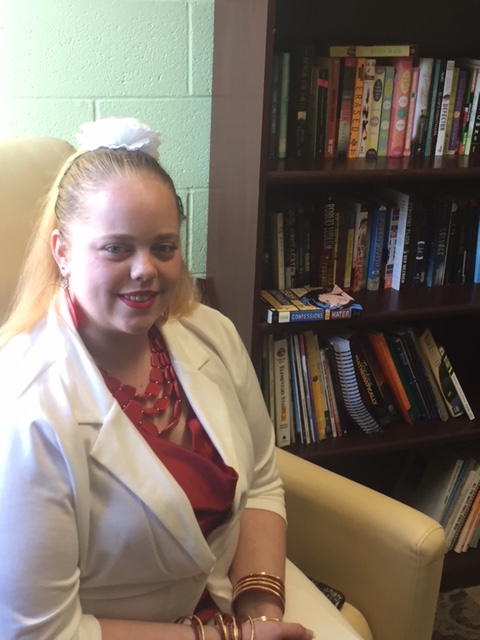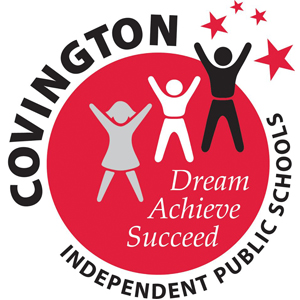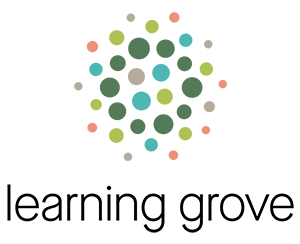By Vicki Prichard
NKyTribune reporter
There’s no disputing that the odds were against Danielle Huff. She was 16-years-old, living in Covington’s City Heights neighborhood and already a single mother of two small children — a two-year-old and a three-month-old.
“I was at Holmes High School, but I was on the verge of being ready to be done with it,” says Huff.
She stuck it out for a while, but by the last week of her sophomore year she was ready to call it quits. Her father had died and she was seeing a counselor to process the grief.
What Huff would come to have in her favor was a caring mentoring program, Mentoring Plus, that put her on a roadmap to turn her life around.
“I definitely wouldn’t be where I am now,” says Huff. “I think the road I was going down before mentoring, I think I would probably have ended up in jail. I was on the streets, I disobeyed my mom.”

Mentoring Plus showed Danielle Huff that she had skills and talent. She credits the program with changing her life.
Mentoring Plus, a Newport-based program which was founded in 2009 provides comprehensive, intensive, long term services for high risk youth and their families. Huff credits the program with turning her life around. Through the program’s encouragement, she began working toward her GED.
At first, Huff was against the idea of the program, but she persevered and was introduced to a mentor. She remained frustrated until one day she called her mentor to blow off steam. The mentor allowed her to vent and she realized that the program — the one-on-one relationship with her mentor — was truly what she needed.
“I would be in the middle of studying and I’d text her and say, ‘I’m getting tired of this,’ and she would come up with a different way for me to study,” says Huff. “She kept me focused.”
Huff earned her GED, but her struggles weren’t over. By this time she had four children and all were in foster care. She hoped the court would see that she was charting a new and better life and return her children to her. She would learn that life still had hard lessons to teach.
“It came down to the best thing for them,” says Huff, who knew she had to think of her children’s well-being first.
“I phoned my attorney and told him what I was going to do. It was best for them. I couldn’t provide for them at the time,” Huff says. “The mentoring group was there to help me through all of that.”
Huff’s three oldest children remained together with an adoptive family, and her youngest daughter was adopted by her foster parent.
Today, after hard times, hard work, and hard decisions, Huff, who is 23 now, is the general manager of Jet’s Pizza in Fort Wright. And she’s learned something else — something about herself — that management is something she enjoys and does well.
“It was the first job that I was able to succeed in and put my mind to it,” she says.
Huff says now she has her eye on a regional management position — — a whole new set of goals that she says wouldn’t be in place if not for her mentoring experience, which taught her what it felt like to achieve.
“You hit that mark and it’s like ‘Bam!’ this is what I’ve been waiting for and now I’ve got it,” says Huff. “It’s such a different feeling. It encourages you to come back because you want to keep doing something else.”
New program, new approach
For 30 years, Kevin Kennedy, the CEO of Mentoring Plus, had worked with disadvantaged youth. He understood that their environments involved abuse, neglect, violence, mental illness, and a host of issues, and he knew there was a key ingredient to help them find a better life.
Kennedy ran a group home in Kentucky for juveniles and had worked in administrative areas in group homes and treatment centers. His last role with the state was with the Kentucky Department of Juvenile Justice as the regional director, where he was responsible for the treatment facilities in the eastern and northern regions. He and his wife, who is licensed in special education, became involved in youth ministry at St. Patrick’s Church in Taylor Mills. But after six years, they decided there were unanswered needs for disadvantaged kids, and they wanted to do something more.
“I began working on the concept of a community-based program,” says Kennedy. “I’d worked a lot of residential programs where kids are sent away, and I thought we really needed something in the community for kids who are struggling.”
They decided that Newport would be the location for their program, but that it would serve all northern Kentucky children and families. They knew that the greatest need would be to serve high-risk kids, kids who in today’s culture deal with multiple issues – mental illness, long term exposure to violence, neglect, abuse, criminal surroundings – poor neighborhoods. Poverty, says Kennedy, is just the beginning with the students they serve.

Hannah Ford has been mentoring students through Mentoring Plus for four years and finds the experience rewarding.
“The thing that really hits you in working with these populations is that the poverty, the kids don’t really complain about the poverty, that’s not in their mind as the thing that impacts them the most, they’re used to that, that’s their life,” says Kennedy.
“They’re used being poor and living from crisis to crisis. But the thing that really impacts are kids and, I think, has the most damaging effect, is living in an environment where a parent is mentally ill or drug addicted, or has criminal behavior and or violent. That’s going to affect them a lot more than just the poverty itself. We said those are the kids we need to serve.”
And so they set out to do it in a way that, he says, is somewhat unique.
First, Kennedy consulted with other likeminded individuals who had expertise in working with families and children, such as Judge Mickey Foellger, who was the first Family Court Judge in the 17th Judicial Circuit serving Campbell County, and asked them if they would be interested in joining with their efforts.
Kennedy embarked on roughly two-and-a-half years of research to determine what was the best approach — what worked best with at-risk children — and put a program together based on what he found. They determined that the necessary ingredients for a successful program included, mentoring, structured programming, life skills, and case management.
Empowering through compassion
High school students who go through the Mentoring Plus program visit the center once a week with their mentor, who commits to a full-year of mentoring. Two staff social workers get involved with every aspect of the students life as well, says Kennedy.
But there was still a missing critical piece, and Kennedy was determined to provide the whole package in order for the program to work.
So, in addition to the case management, which works with the kids as well as their families, and a weekly mentoring program, they added a spirituality component.
Kennedy says spirituality is something that most agencies don’t address for a range of concerns, but he and his team were adamant that it was something the kids need.
“Our mission is essentially to empower our kids and families to become healthy, productive adults,” says Kennedy. “If you’re truly serious about that, and you want to bring about lifelong changes, you can’t ignore spirituality.”
He points out that spirituality doesn’t mean religion.
“What we mean is we are going to provide the kids with every opportunity to explore their own spirituality,” he says.
Before the weekly dinner, they begin with a prayer, and they end the evening with a prayer as well.
“We pray for someone in their family or whatever,” says Kennedy. “We introduce that to the kids and say, “If this isn’t your thing that’s fine,” but you’d be amazed at how many kids want to be part of that, and it gives them hope, and that’s our mission.”
Restoring hope and positive outcomes
Since the program’s beginning, Kennedy set metrics in place to measure outcomes.
“In general, the outcomes have been that more than eight out of ten of our kids that we work with are doing better in school, have better relationships with their peers and families, and are better able to resist drugs and school,” he says.
He credits those results with the comprehensive nature of the program.
“We feel like we’re getting those results because of the whole package being provided, and provided in a compassionate way.
Each year, since the program began, Mentoring Plus serves more kids and families.
“Right now we have between 35 kids and families in the program and we’re seeing great results,” says Kennedy. “It’s uplifting to see it first hand.
Meaningful to mentors too
Hannah Ford began mentoring with Mentoring Plus in 2013. Having enrolled at Northern Kentucky University a few years after high school, majoring in psychology and marketing, she saw an ad for mentors in a campus email. The idea seemed a little out of her comfort zone, but she wanted to give it a try. Plus, she liked the idea of a mandatory one-year commitment for mentors.
“Stability is not something a lot of them have, so just knowing that the same person is going to be here every Monday or Thursday to spend time with them, whether they like it or not, is a valuable thing.
Four years later, Ford says she feels like she’s had three unique experiences with each of the students she’s mentored.
She mentored her first student for a year and a half.
“In the first ten minutes she was very open with me,” says Ford. “I didn’t think it was going to be that instant of a connection.”
She developed a good relationship with her second student the following year, and wasn’t planning to mentor again, but after she was hired as a short term intern to assist the program’s volunteer coordinator, one of the new students approached her at an evening mixer and asked her if she would be her mentor.
“I said, “Let’s do it,” says Ford.
Ford says the first student she mentored continues to keep in touch with her.
“A year and a half after mentoring her she reached out to me to help her get volunteer service hours,” says Ford. “She had no one who could drive her, and it felt good that she knew she could reach out to me.”
As for how the program identifies mentors, Kennedy says most of the mentors approach them.
They have online recruiting strategies, and attempt to create awareness through yard signs, but the Mentoring Plus volunteer coordinator is solely responsible for recruiting mentors. Applicants must be 21-years-old, go through a screening process, background checks, interviews and reference checks.
“It’s always a struggle because it is a big commitment — every week for a year,” says Kennedy. “Right now we have between 30 and 35.”
Financial support to provide the program, which is free to for kids and families, can be a struggle too. Kennedy says Mentoring Plus has received grant money, a county grant from Campbell County, and some state grants in the past, but no federal grants.
“Essentially, the majority of the money comes from individual donations, and those come through our fundraising events,” says Kennedy.
“I’ve been in this line of work for many years, and there are many agencies that do good work but I don’t know of any that cover all that we do — spirituality, case management, structured programming and long term. Some of our kids have been with us three years,” says Kennedy. “We said, initially, these problems that our kids have experienced did not happen overnight and you’re not going to fix them in six months. And that’s a ministry — a program is six months, one year; our doors are always open to our kids and they stay as long as they need to, as long as they’re benefitting from the program.”



















